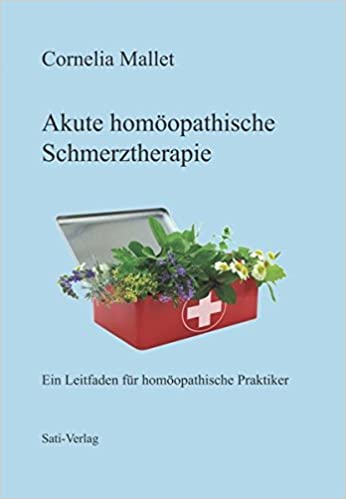Acute homeopathic pain therapy
A Guide to Homeopathic Prescribing for Pain and Acute Disorders.
It is possible to successfully treat pain and acute illnesses with classical homeopathy. This book is mainly a reference work for numerous pain and emergencies and their homeopathic therapy. In her book, the experienced non-medical practitioner and classic homeopath Cornelia Mallet describes emergencies such as strokes, pain from various injuries and colic, and even acute shock therapy. For each indication, the corresponding homeopathic remedies are mentioned and also described in detail. This work encourages the use of homeopathy in severe pain and emergencies.
Cornelia Mallet is a student of Georgos Vithoulkas, Jan Scholten, Rajan Sankaran and other great homeopaths. She has been running a successful practice for classical homeopathy in Landshut and in Chiemgau since 1992.
Akute homöopathische Schmerztherapie: Ein Leitfaden für homöopathische Praktiker → Das Buch auf amazon.de
Homeopathic pain therapy
It is possible to relieve pain with homeopathic remedies. I impart knowledge about homeopathic painkillers in a two-day seminar.
It is primarily about physical pain, which of course inevitably affects the emotions and psyche of the patient. When the physical pain is relieved, the patient's psyche is usually better as well.
Every injury and every pain is associated with a shock or a shock-like state, whereby the sensitive balance, the homeostasis, is disturbed. This takes place first on a biochemical level, where enzymes, catalysts, neurotransmitters or hormones try to get back into balance. Even introducing foreign proteins (vaccinations, insect bites, bacterial toxins and decay products) disturbs this sensitive balance and weakens the immunity, even triggering a physical illness up to an emotional illness.
The subject of homeopathic pain therapy is aimed at all medical professions.
Not only every naturopathically experienced mother knows about the amazingly fast effect of Chamomilla, for example, when her child is crying out in pain while teething, or the excellent effect of Apis when the child has been stung by a wasp.
Many amazed patients to whom I advised arnica after a tooth extraction benevolently stated that they did not need painkillers and the healing process progressed rapidly. Have courage to use homeopathy for pain and emergencies.
In the acute case, the patient's symptoms speak and clearly indicate the acute homeopathic painkiller. In this respect, you can adopt the suggestions given in the seminar 1:1.
In chronic cases, however, a very precise homeopathic anamnesis is required, whereupon the homeopath prescribes the so-called "constitutional remedy" according to the rules and laws of classical homeopathy. This should only be reserved for the experienced homeopath.
When finding a remedy for chronic cases, the homeopath determines exactly the dynamics of the patient during an anamnesis of at least 2 hours, which then leads him to the simile (the similar remedy), which reaches the disease in depth, i.e. at the root, and dissolves it can.
In chronic cases the homeopath does not work symptomatically. That would be a suppressive measure and does not correspond to a holistic healing.
While with an acute prescription the homeopathic pain reliever can work within seconds, at both low and high potencies, with a chronic prescription the homeopathic remedy can take effect within days and weeks, even months.
Here we limit ourselves to acute cases of pain and not to the treatment of chronic pathologies. It is not intended that a patient has chronic headaches and the user is continually treating with acute headache remedies.
For acute pain caused by an accident, injury, surgical intervention, etc. the patient's symptoms change, whereupon the user then treats acutely. In these cases, the acute symptoms take over the entire dynamic of the patient, so that the patient must first be strengthened by the acute homeopathic remedy.
Samuel Hahnemann, the founder of homeopathy, himself, in §67, Organon, advocates palliation in emergencies. In this respect, you make no mistake in treating acute cases as acute.